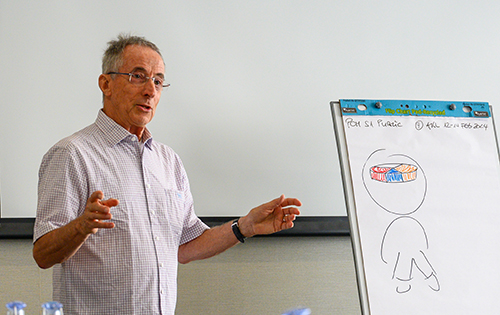
A few weeks ago I was running another 3-day PCM seminar. The group consisted of a broad variety of personalities, professions, nationalities.
As their facilitator I had the privilege to guide the participants through a fascinating journey. The deeper we dug into PCM, the more they experienced ‘light bulb moments’.
Suddenly they started to understand why ‘things’ happen in their lives, and what influence those events have on their relationships at home and at the workplace, in happiness and when things don’t go so well.
We explored why every Monday morning some people feel as if they are jumping into a dark, narrow, stinky tunnel. They squeeze themselves through this tunnel to finally surface on Friday afternoon when they can start to breath again. Over the weekend they recharge their batteries to be ready to return to the weekly ‘battlefield’.
And then there are others who love their ‘work’, feel fulfilled and passionate about what they do. We discussed why for some ‘work’ is synonym for hurtful, boring, bullying, uninspiring… while others feel fulfilled, engaged, happy, motivated.
We concluded that managing to get our specific psychological needs met positively is the main contributing factor whether or not I’m happy in my job.
Tragically, if not trained in PCM, people often have no idea why they are not happy, what the possible long-term damage can be – or what each of us can do to improve our situation significantly. Such epiphanies sometimes become emotionally intense.
I don’t want to go deeper into this topic right now, but rather report an interesting observation during this seminar.
Who is asking questions and why?
Two participants were particularly engaged and asked a lot of questions during the workshop. The questions were smart and showed that they wanted to know ‘exactly’ how PCM was developed and researched. I also observed that a few of the other participants felt ‘sorry’ for me being asked so many questions. They took these questions a sign of distrust and critique on me personally.

PCM is about second by second observation of behaviour. This was a unique opportunity to demonstrate and explain how ‘not understanding why others tick differently’ can easily lead to conflict.
On the last day, after covering all PCM concepts and theory, I asked the group: “Who in here is asking most questions?” Those who have felt ‘sorry’ for me very quickly pointed at those two attendees. I saw them mentally loading their guns because they feared I might want to ‘pay them back’.
I quickly explained: “Yes, it has been those two gentlemen. Now let’s ask ourselves why they were asking these questions, and what effect their behaviour had on other participants?”
The two participants have a personality structure that focuses strongly on trust, values, beliefs and opinions, which means their existential question in life is ‘am I trustworthy?’. Asking a lot questions makes sure that they don’t buy into any fads because that might reflect on their own trustworthiness.
Sometimes people with such a preference can come across as intense, probing or even attacking. As a consequence, others might feel the need to rescue the ‘victim’ of the questions.
Behavioural Dynamics
We unpacked the behavioural dynamics between the need of answering those questions, and the role others play answering those questions positively or negatively. PCM allows us to do this objectively.
The two participants shared with the group that they just had one of those ‘epiphanies’ and started to understand why sometimes people push back or shut down when they are asking their questions. And the more people pushed back, the more they insisted on receiving a precise answer or even attacking other eventually for not showing enough commitment.

What increases the chance for a conflict is the fact that some personalities show uncertainty and lack of self-confidence when getting under pressure – like when they are being asked probing questions. This in turn might reinforce doubts in value-based personalities about the credibility of the information received. And the dance goes on…
The other participants learned that by responding to those questions with their own beliefs and opinions is the correct ‘communication match’ to keep the conversation on track.
It is impressive how quickly misunderstanding leads to miscommunication, mismanagement and conflict simply because we don’t understand other peoples’ behaviours. With the second by second observations and interventions with PCM, such dynamics become not only transparent, but much less volatile.
Want to learn more? About yourself, and about others? Book a PCM seminar! See you there!

